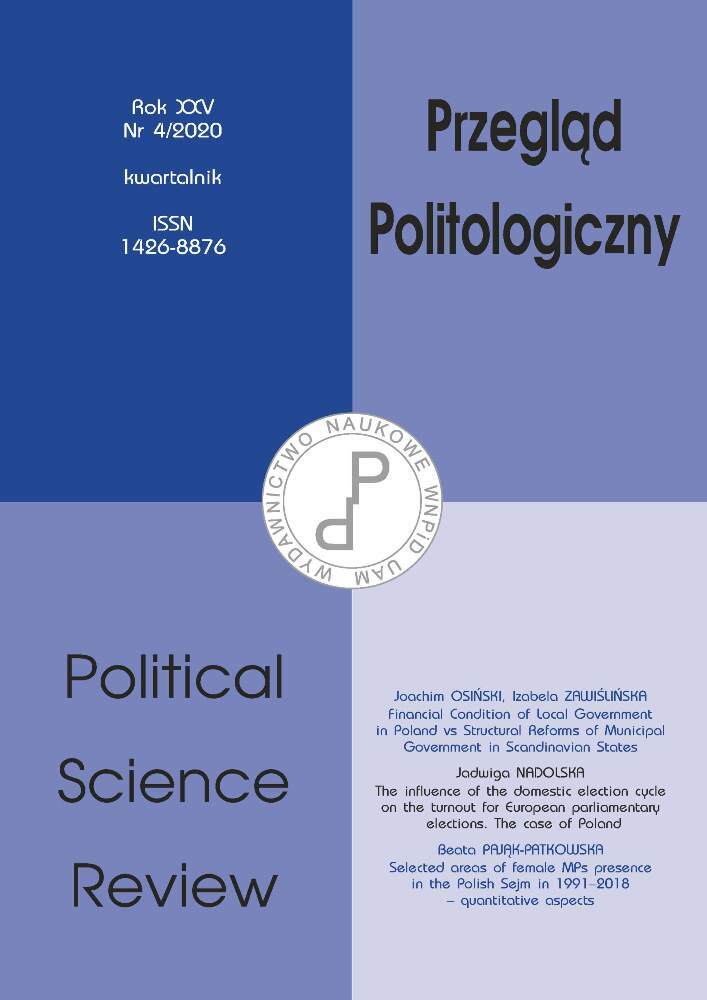Abstract
The “digital environment” is perceived as a new situation in the political consciousness of the society, as well as a source of xenophobia in politics. In the context of political uncertainty in the world, journalism is becoming a vehicle for spreading cyberphobia – a new type of social fear. Cyberphobia is understood as a natural reaction of public consciousness to the intensification of new types of crimes against the individual and society with the use of “digital” technologies. The new informational reality has predetermined cyberthreats that appeared in the media leading to the most dangerous social phobia. This, for instance, has been combined with the idea of the “Russian hacker” and his personification as the world Evil.
References
Bessmyslennyy razgovor o russkikh khakerakh mezhdu Mariano Rakhoem i Karlosom Erreroy [Pointless conversation about Russian hackers between Mariano Rajoy and Carlos Herrera] (2017), in: InoSMI, 17 November, https://inosmi.ru/politic/20171117/240790844.html, 05.01.2020 (in Russ.).
Blokhin I. N. (2019), Zhurnalistika kak sotsiokul’turnyy fenomen [Journalism as a sociocultural phenomenon], in: Zhurnalistika i kul’tura obshchestva [Journalism and society culture], Ucheb. posobie, ed. M. A. Voskresenskoy, SPb.: Izd-vo VVM, pp. 6–26 (in Russ.).
Boyt P. (2019), Doklad CrowdStrike: russkie khakery samye bystrye [Report by Bloods Strike: Russian hackers are the fastest], in: InoSMI, 20 fevr., https://inosmi.ru/social/20190220/244611908.html, 05.01.2020 (in Russ.).
Bridzh M. (2019), Russkie khakery ostavili kitaytsev daleko pozadi [Russian hackers left the Chinese far behind], in: InoSMI, 23 February, https://inosmi.ru/social/20190223/244630775.html, 05.01.2020 (in Russ.).
Bystritskiy A. (2019), Vosstanie mass [Uprising of the masses], in: Izvestiya, p. 3, 25 Dec., https://iz.ru/957667/andrei-bystritckii/vosstanie-mass, 05.01.2020 (in Russ.).
Graff G. (2017), Okhota na russkogo khakera [The hunt for Russian hacker], in: InoSMI, 22 marta, https://www.wired.com/2017/03/russian-hacker-spy-botnet/, 05.01.2020 (in Russ.).
Grinberg E. (2019), Kak russkie khakery chut’ ne ostavili Ukrainu bez elektrichestva [How Russian hackers almost left Ukraine without electricity], in: InoSMI, 13 sent., https://inosmi.ru/politic/20190913/245821827.html, 05.01.2020 (in Russ.).
Gurvits I. (2016), Ne vsiakii khaker – russkii shpion [Not every hacker is a Russian spy], in: InoSMI, 29 November, https://inosmi.ru/politic/20161129/238298756.html.
Karaganov S. A. (2019), Ukhod voennogo prevoskhodstva Zapada i geoekonomika [Western military superiority and geoeconomics], in: Polis. № 6, pp. 8–21, https://www.politstudies.ru/files/File/2019/6/Polis-6-2019-Karaganov.pdf, 05.01.2020 (in Russ.).
Khantington S. (2003), Stolknovenie tsivilizatsiy [Clash of civilizations], per. s angl. OOO «Izdatel’stvo AST», M., 603 p.
Kozlovskiy V. (2017), Delo Selezneva: nechistoserdechnoe priznanie osuzhdennogo v SShA russkogo khakera [The case of Seleznev: cruel confession of a Russian hacker convicted in the United States], in: InoSMI, 22 April, https://inosmi.ru/social/20170422/239199260.html, 05.01.2020 (in Russ.).
Limitoun Dzh. (2016), Pochemu iz russkikh poluchayutsya khoroshie khakery? [Why do Russians get good hackers?], in: InoSMI, 6 May, https://inosmi.ru/social/20160506/236443184.html, 05.01.2020 (in Russ.).
Myushemble R. (2005), Ocherki po istorii d’yavola: XII–XX vv. [Essays on the history of the devil: XII–XX centuries], per. s fr., Novoe literaturnoe obozrenie, M., 584 p. (in French).
Nazarchuk A. V. (2011), Ideya kommunikatsii i novye filosofskie ponyatiya KhKh veka [The idea of communication and new philosophical concepts of the twentieth century], in: Voprosy filosofii [Philosophy Issues], № 5, pp. 157–165 (in Russ.).
Neller M. (2016), Kak odin nemets legendarnogo russkogo khakera razoblachil [How a German of the legendary Russian hacker exposed], in: InoSMI, 8 May, https://inosmi.ru/multimedia/20160508/236453693.html.
Rassel B. (2017), Russkie khakery ispol’zovali programmnoe obespechenie Kasperskogo dlya poiska nezashchishchennykh dokumentov ANB [Russian hackers used Kaspersky software to search for unsecured NSA documents], in: InoSMI, 6 October, https://inosmi.ru/politic/20171006/240454058.html, 05.01.2020 (in Russ.).
Smit R. (2018), Rossiyskie khakery mogut otklyuchit’ goryachuyu vodu v SShA [Russian hackers can turn off hot water in the United States], in: InoSMI, 24 July, https://inosmi.ru/politic/20180724/242814221.html, 05.01.2020 (in Russ.).
Voli D., Makmillan R. (2018), Nikto ne znaet, pochemu russkie khakery proignorirovali promezhutochnye vybory [No one knows why Russian hackers ignored midterm elections], in: InoS.MI, 13 November, https://inosmi.ru/politic/20181113/243922440.html, 05.01.2020 (in Russ.).
Volodenkov S. V. (2015), Internet-kommunikatsii v global’nom prostranstve sovremennogo politicheskogo upravleniya [Internet communications in the global space of modern political governance], Izd-vo Mosk. un-ta, M., 272 p. (in Russ.).

